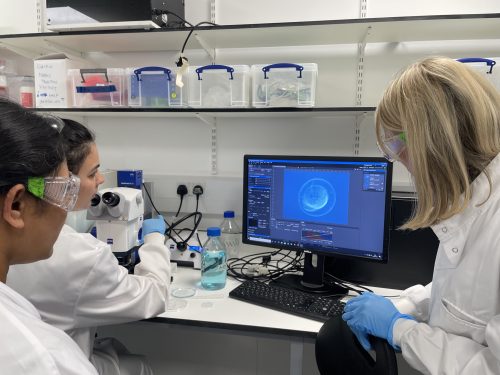Secondary school teachers’ residency in lab
Posted by tomoko Watanabe, on 5 October 2023
In June of this year, five secondary school teachers who teach BTEC and A levels students from Wales and Oxfordshire spent a week with us at the Department of Physiology Anatomy and Genetics (DPAG) and the Institute for Developmental and Regenerative Medicine (IDRM) at the University of Oxford. Our aim was to support and promote STEM subjects among students by providing their teacher the opportunity of a residency in a modern research setting, where they could experience how research is conducted on a day-to-day basis, network with researchers and generate their own experimental results to enrich their teaching.

The program was fully funded by Jesus College and Trinity College, Oxford, who sponsored transportation, accommodation and meals. We also received funds from DPAG for substitute teaching cover for the schools while their teachers were with us in the lab, which the participating teachers said was absolutely essential in enabling the schools to let them join the week long residency. We had a great deal of interest in the scheme and more teachers than we could accommodate applied to take part.
We asked the teachers why they chose to spend a week away from home and work and here is what Clare, a secondary school teacher from Oxfordshire said:
“I realised that although I had taught science for 20 years, I knew nothing about a career in Scientific research or as a science lab technician in research. I had many A level students interested in this area who would ask my advice, both gifted students who wanted to do a PhD and work as a research scientist, and students who were excellent practically and wanted to work in some capacity within science.
I felt that I needed to know more in order to support and advise them. I also wanted to develop my own practical techniques, having studied a degree that was almost entirely theoretical, with almost no lab experience. In addition, my school had asked me to help giving students mock interviews for Biology, and I felt I needed to know more about the Oxbridge interview process.”
At hosting institutes, the teachers spent their times with researchers in their labs. A daily work plan (with associated risk assessments) was prepared beforehand and shared with the teachers, researchers who worked with the teachers and local safety officer.
At DPAG, two teachers shadowed researchers one-on-one, following their research. The teachers and their host researchers in this group had several productive discussions on details of the research: “The experience of having been with a [resident teacher] was a win-win exercise. On my part, knowing how a teacher organises their classes, understanding the way that they see things, and how they are always thinking about how to make things comprehensible for others, I would say that I was sharing the bench with an expert in public engagement.”
“From [the teacher’s] side, she was fascinated by how the theory is put into practice in a research project, from the experimental design, and going through the methods, to how the results are analysed and discussed how they are in line with the research project hypothesis, I remember she said: ‘I could go back now to my student and talk about this experience for weeks and weeks” said Mayra, one of the researchers.
At the IDRM, three teachers participated in hands on experiments and attended research talks. Eight host researchers at the IDRM formed a group to work with the three teachers, and set up typical experiments to introduce them to research topics. Teachers formed a group to work on an experiment together as well as one-on-one with a host researcher. Some of the activities included:
- Whole mount Hybridization Chain Reaction on E9.5 mouse embryos
- Harvest and culture of pre-implantation mouse embryos and cave fish embryos
- Imaging injured adult fish hearts
- Basic tissue culture technique and organoid differentiation
- Genotype PCR, confocal imaging, etc
The teachers also enjoyed learning about available public engagement/outreach resources, listened to talks taking place at the IDRM, and met with staff with different training backgrounds. The teachers felt it was particularly useful for them to meet research staff with a non-traditional entry into a career in research, as there are students who love science and experiments who might not think academia is for them, and they can encourage these students to aspire to a career in research.
The experience was tremendously fulfilling for teachers and researchers alike. Work with the teachers provided the researchers a valuable opportunity to think about the societal context and impact of their research, how to talk about the relevance of their research, and of course, gave them the opportunity to talk about the science that excites us all.
If anyone is interested in doing something similar and would like tips, please don’t hesitate to get in touch with us!
Participating labs and their locations:
DPAG – Kavli Institute for Nanoscience Discovery: Carlyle and Lakhal-Littleton groups
DPAG – Institute of Developmental and Regenerative Medicine: Mommersteeg, Riley, Srinivas, and Stone groups
Many thanks to the participating teachers, Jesus and Trinity College Access Officers, DPAG EDI officer, and researchers who donated their expertise and time.


 (No Ratings Yet)
(No Ratings Yet)